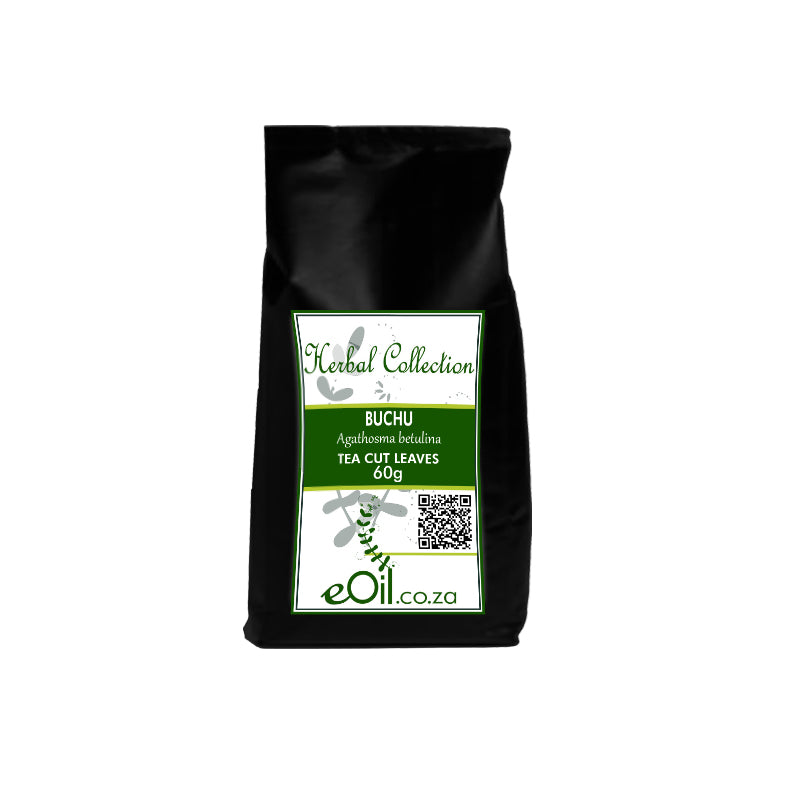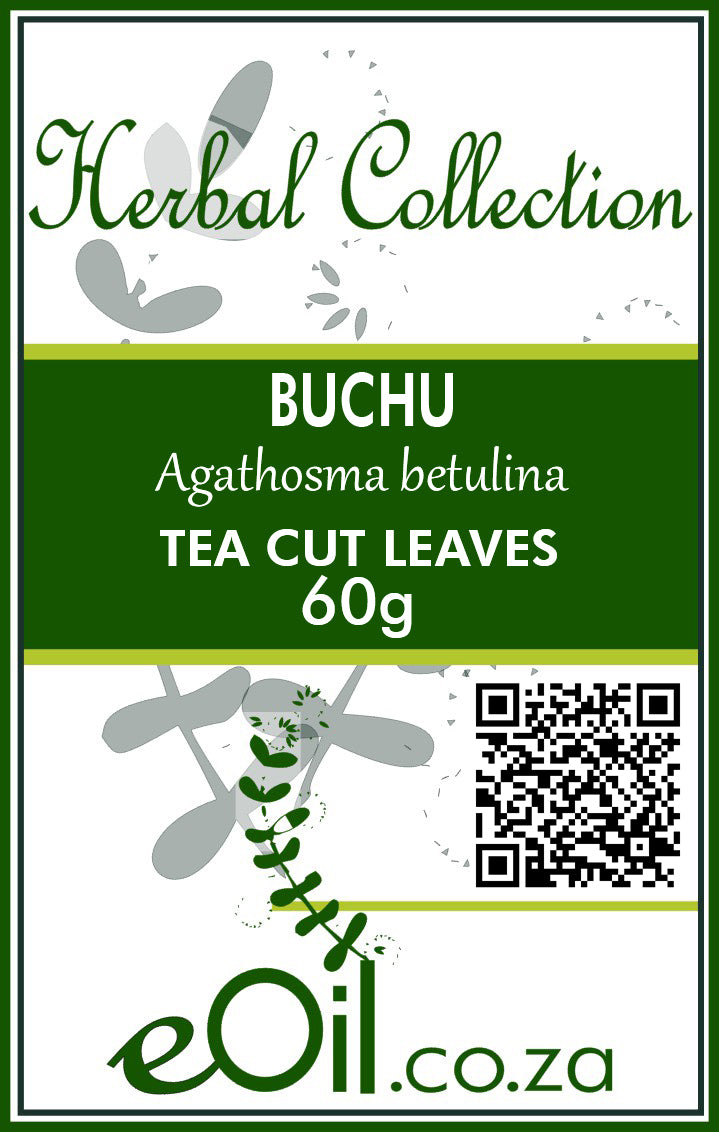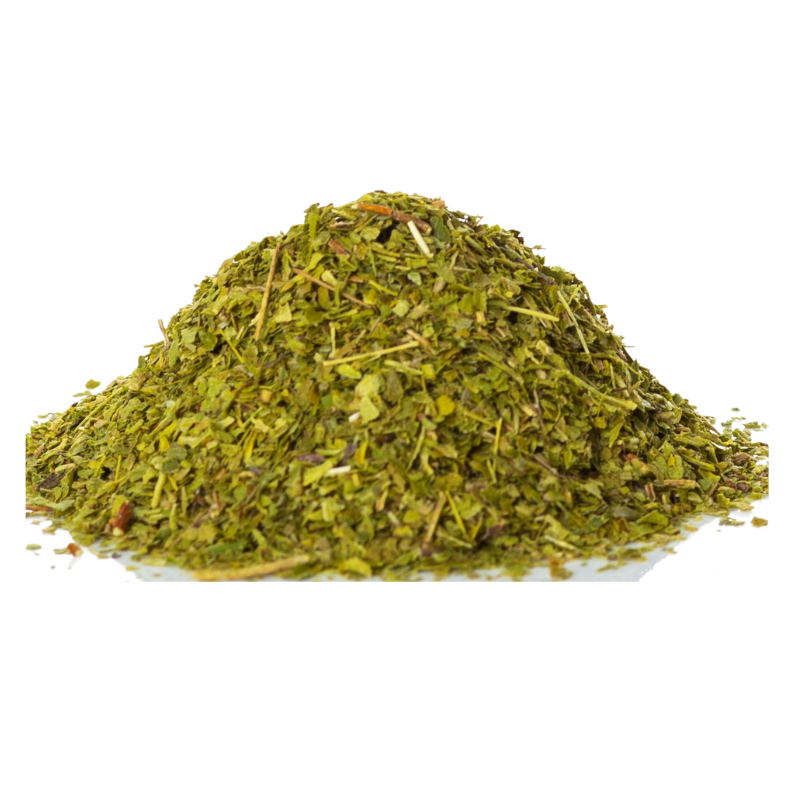Buchu Leaf cut - Herbal Collection
Buchu Leaf cut - Herbal Collection - 60 GR is backordered and will ship as soon as it is back in stock.
Description
Description
Brew the "Miracle Herb" of the Western Cape.
Our premium Dried Buchu Leaves (Agathosma betulina) are the authentic, raw cut herb, sustainably sourced from the mountains of South Africa.
Revered by the Khoisan people for centuries, Buchu is world-famous for its potent antiseptic and diuretic properties. It has a distinctive, minty-blackcurrant aroma and is the essential ingredient for making traditional Buchu Tea, Buchu Vinegar, or Buchu Brandy.
Key Benefits & Uses:
The #1 Herbal Tea for UTIs: Buchu tea is the "gold standard" natural remedy for urinary tract health. It acts as a powerful urinary antiseptic, helping to soothe the bladder and fight the bacteria associated with cystitis and bladder infections.
Natural Diuretic (Water Retention): It helps the body flush out excess fluid. It is traditionally used to relieve water retention, bloating, and the swelling associated with PMS.
Gout & Arthritis Support: By stimulating the flushing of the kidneys, Buchu helps to eliminate excess uric acid, making it a trusted traditional remedy for managing gout and rheumatic pain.
Digestive Tonic: A strong cup of Buchu tea is traditionally taken to ease stomach cramps, nausea, and indigestion after a heavy meal.
How to Use (DIY):
Buchu Tea: Steep 1-2 teaspoons of dried leaves in boiling water for 5-10 minutes. Strain and enjoy. (Delicious with a slice of lemon and honey).
Buchu Vinegar: Steep a handful of leaves in white vinegar (or apple cider vinegar) for 2 weeks to create a potent antiseptic wash or internal tonic.
Important Cautions:
Do NOT use during pregnancy.
Consult a doctor if you have acute kidney inflammation.
IDENTIFICATION
Buchu Leaf (Agathosma betulina)
Common Names: Round-leaf buchu, Short buchu, Boegoe (Afrikaans)
Scientific Name: Agathosma betulina (formerly Barosma betulina)
Family: Rutaceae
INCI Name: Barosma Betulina Leaf Extract
CAS Number: 68650-46-4
Part Used: Leaves
Identification and Characteristics
Buchu is an aromatic shrub native to the mountainous regions of South Africa's Western Cape. It grows to about 1-2 meters tall with small, round, leathery leaves that are 15-20 mm long. The leaves contain numerous oil glands that give off a strong, minty-blackcurrant scent when crushed. The plant produces small star-shaped flowers that are white to pale purple in color.
Traditional Uses
Buchu has been used for centuries by indigenous South African peoples for medicinal purposes. It was traditionally used to treat:
- Urinary tract infections
- Kidney and bladder problems
- Stomach ailments
- Rheumatism and gout
- Coughs and colds
In Western herbal medicine, buchu is primarily used as a diuretic and urinary tract antiseptic.
Active Compounds
The main active compounds in buchu leaves include:
- Diosphenol (40-45%)
- Isomenthone (≈20%)
- Limonene (10-15%)
- Menthone (≈10%)
- Pulegone
- Flavonoids like diosmin and hesperidin
Preparation and Dosage
To prepare buchu leaf tea:
- Use 1-2 grams of dried leaves per cup of boiling water
- Steep for 5-10 minutes
- Strain and drink up to 3 cups daily
Note: Do not exceed recommended dosages. Consult a healthcare professional before use.
Potential Benefits
- May help treat urinary tract infections
- Possesses anti-inflammatory properties
- May lower blood cholesterol levels
- Has antioxidant effects
- Could aid digestion
Precautions and Side Effects
Buchu is generally considered safe when used in recommended amounts. However, it may cause:
- Stomach irritation in some people
- Increased menstrual flow
- Liver damage in large amounts
Contraindications:
- Pregnancy and breastfeeding
- Kidney inflammation
- Liver disease
- Bleeding disorders
Regulatory Status
Buchu leaf is generally recognized as safe (GRAS) by the FDA for use as a flavoring agent. However, its use in dietary supplements is not FDA-approved.
INFORMATION
Source : http://www.wikiphyto.org/wiki/Buchu
Reference on http://www.wikiphyto.org
Translation in English by Google Translate (go to the page of the source linked | on Chrome cellphones go on the 3 dots on the top right and select translate in your preferred language | on laptop right click your mouse and select option translate when hoovering on the page
plant name
Buchu, Sweet Buchu , Short Buchu
International Latin denomination
Agathosma betulina (PJ Bergius) Pill. (= Barosma betulina (PJ Bergius) Bartl. and Wendl.), Agathosma crenulata (L.) Pill. (= Barosma crenulata (L.) Hook), Agathosma serratifolia (Curt.) Spreeth (= Barosma serratifolia Willd.).
botanical family
Rutaceae
Description and habitat
- Fragrant shrubs (because they are rich in essence) grown in the Cape region of South Africa, on red clay-sandy soils (rich in iron), pruned to obtain a bushy tuft like the tea plant
- The blackcurrant smell is due to flavonoids
- The essential oil is contained in schizolysigenic pockets
History and tradition
- Buchu is a traditional remedy of the Hottentots of Namibia
- “Buchu Camphor” crystallizes at room temperature
Parts used
- Sheets
Dosage forms available
- Leaf tincture
Usual dosages
Composition
Main components of the plant
- Essential oil (2% and at least 1.3%): diosphenol or Buchu camphor , ketones ( menthone , pulegone ), monoterpene alcohols ( terpinen-4-ol ), and monoterpene hydrocarbons
- Flavonoids : hesperidoside , diosmin and diosmoside , rutoside
- Mucilages (leaf swells in hot water)
Main components of buds or young shoots
Main components of essential oil
- Diosphenol which crystallizes at room temperature
- Monoterpene ketones : isomenthone , menthone and pulegone
- Monoterpene alcohols : terpinene-4-ol
- Monoterpene hydrocarbons : limonene , myrcene and alpha-pinene
Properties
Plant properties
- Diuretic & antiseptic in benign inflammatory diseases of the urinary tract
- Antimicrobial, antifungal [1]
- The essential oil diosphenol , excreted as a glucuronide derivative, is antibacterial
- Anti -inflammatory and diuretic flavonoids
- The pulegone is an emmenagogue
- Balsamic and diaphoretic
- The other Barosma would be inactive and constitute a falsification
Bud properties
Properties of essential oil
Directions
Indications of the whole plant (phytotherapy)
- Cystitis, urethritis and inflammation of the bladder, prostatitis and prostate cancer [2]
- Vaginal candidiasis (?)
- Nephritis (?)
Indications of the bud (gemmotherapy)
Specific indications of essential oil (aromatherapy)
Known or suspected mode of action
- It is the diosphenol of the essential oil, excreted in the form of a glucuronide derivative, which is antibacterial, with terpinene-4-ol
- Flavonoids are diuretics
Usual formulations
Regulations
- French Pharmacopoeia list A (sheet)
Possible side effects and precautions for use
- The essential oil with diosphenol and pulegone can cause irritation phenomena
Bibliographic references
- Aller↑ Lis-Balchin M, Hart S, Simpson E. Buchu (Agathosma betulina and A. crenulata, Rutaceae) essential oils: their pharmacological action on guinea-pig ileum and antimicrobial activity on microorganisms. J Pharm Pharmacol. 2001 Apr;53(4):579-82. PMID 11341377
- Aller↑ Steenkamp V. Phytomedicines for the prostate. Fitoterapia. 2003 Sep;74(6):545-52. PMID 12946716
- Trinder-Smith, T. & Raimondo, D. 2016. Agathosma betulina (PJBergius) Pillans. National Assessment: Red List of South African Plants version 2020.1. Accessed on 2020/12/11
- Moolla A, Viljoen AM. 'Buchu' -Agathosma betulina and Agathosma crenulata (Rutaceae): a review. J Ethnopharmacol. 2008 Oct 28;119(3):413-9. PMID 18725278
- Wichtl Max, Anton Robert. Therapeutic plants: Tradition, officinal practice, science and therapy. Ed. Tec & Doc. Cachan. 1999. p. 70
CAUTION
Buchu is not recommended during pregnancy ( linked to risques de miscarriage) and breastfeeding. reserved For Adults and children over 12 y.o.
Store in a cool, dry place, away from light. Keep tightly closed, away from the reach of Children and pets.
Do not exceed the daily dose.
This product is not intended to prevent or cure any form of illness or disease.
If you are pregnant or nursing ; If you have a medical condition or are in the course of medical treatment ; If you are programmed for theater/operation in the near future, please consult your healthcare practitioner before using this product.
This product cannot replace a varied and balanced diet and a healthy lifestyle.
This product has not been evaluated by the SAHPRA for its quality, safety or intended use.
For More Information please check our General Safety Herbal products Page

Buchu Leaf cut - Herbal Collection - 60 GR is backordered and will ship as soon as it is back in stock.






